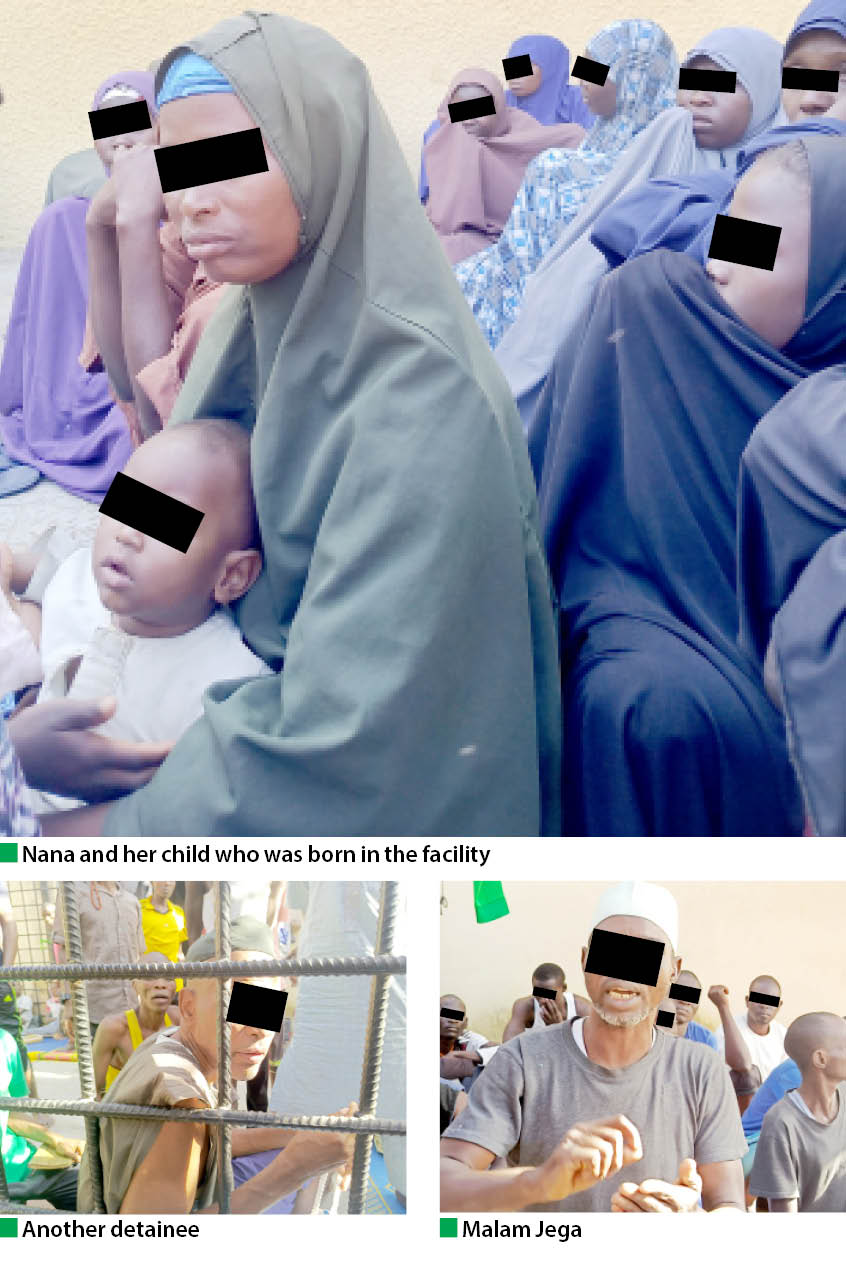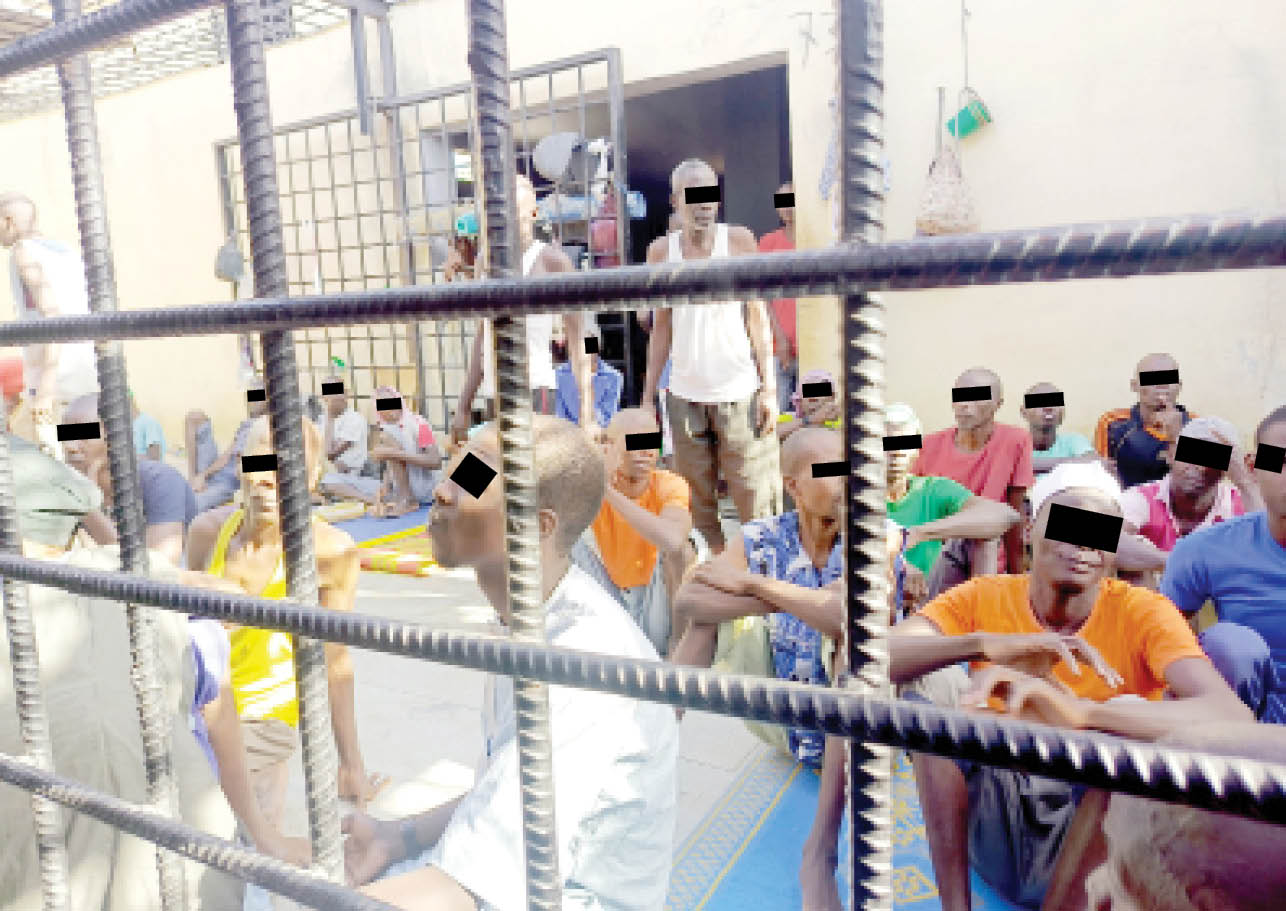Over 2,000 people under investigation over suspicion of Boko Haram activities have been waiting for justice at Giwa Barracks, Maiduguri, the Borno State capital, Daily Trust on Sunday reports. They include suspected Boko Haram fighters, their wives, parents, children and others.
It was learnt that their cases have dragged for years due to a variety of reasons.
According to military record, 2,048 people were held in that facility as at March 2023. This number included 35 women, 10 female children, seven male children, while the remaining 1,991 were adult males.
Our correspondent who visited the facility saw how these detainees were crammed into four iron rod cages/cells under a soaring Maiduguri temperature that hovers between 38 and 43 degrees Celsius.
- Ignore ex-Zamfara gov on bandits’ negotiation, Ex-AIG tells Tinubu
- Nigeria’s peace guaranteed with Musa as new CDS – Irabor
A former Theatre Commander, Operation Lafiya Dole, Major-General Rogers Nicholas, explained to Daily Trust on Sunday that the 200- capacity detention centre, which was constructed by the 47 Engineering Brigade of the Nigerian Army, was inaugurated in 2013.
The facility is meant to serve as a temporary detention centre to investigate people arrested at warfronts and profile them, either for prosecution or reintegration.
However, most of the inmates interviewed by our correspondent claimed they had stayed at the detention centre for up to 10 years without being charged to court, while many of them said they had spent more than a year.
Majority of them also claimed that they had lived in that crowded condition without being formally told of their crimes so that they would defend themselves, when they would be prosecuted or when their detention would end.
On its part, the military sees the facility as an essential part of their operation to end Boko Haram insurgency in the North East.
A captain in charge of the facility said it’s a temporary detention centre, adding, “It is of world standard and not bad as people imagine. We don’t condone maltreatment of inmates by soldiers.”
He said no inmate would be kept in the facility for too long without having a case to answer.
We don’t know our offences – Suspects
Some of the detainees told our correspondent that apart from the fact that they did not know why they were being detained, they had lost their connections to the world, saying it is the worst tragedy that could befall anyone.
They claimed they had not gotten in touch nor seen their parents and children for as long as they had stayed in the facility.
Asked if they were given access to lawyers to enable them challenge their detention, they said, “Such opportunity has not been given to us. Once you are here you don’t have any right,” one of the inmates said.

One of the soldiers guarding the cell said, “It is a pity that some of them are being used as prey to get to their loved ones.”
He narrated how an aged mother of a stubborn Boko Haram commander was held for four years in the facility and was used as a bait to get to her son.
During interrogation, the woman said her son told her that he was doing the work of God, but over the years, she was made to understand that what her son was doing was wrong and she became remorseful.
“She regretted that her son was a combatant. The military was able to connect her with the son through a repentant Boko Haram fighter. They spoke and the mother convinced him to repent and surrender to the military. I think she would soon be released.
“This is in line with retired General Ishaka’s initiative. Initially, the son claimed that his mother was killed by the military, therefore, he would continue with terrorism, but fortunately, the mother was alive and they were connected on phone.
“Now, the son has promised to lay down arms, turn himself in and the weapons in his possession to be surrendered to the military, given the condition that his mother would be set free,” the soldier said.
A detainee, Malam Muhammad Jega, who was arrested by the military at the Chadian border to Nigeria in Bakassi, said most of the detainees in the facility did not sleep at night, thinking about the families they left behind and the future that lies ahead.
“I am a smoked fish dealer in Bakassi. I was into this business even before former President Obasanjo ceded Bakassi town to Cameroon. In 2020, I was on a business trip when the military intercepted me, saying they were suspecting the goods I was carrying. That’s how I was brought here.
“This is my third year in this place without being told my actual offence. Our wives have remarried because they gave up on us. Our children are left in the streets to beg for food. We also lost our businesses. In fact, we have lost everything. And we don’t know when we would be set free to reunite with our families. We are in a very difficult situation.
“I am appealing to military authorities and the federal government to look into our plight and set us free,” he said.
At the female section of the facility, a television set displayed a counterterrorism film on a DSTV channel as the detainees sat on rubber mats.
Malama Nana said she was arrested on her way to market and forced to leave four children, an aged mother and husband behind at home.
“I was intercepted by a convoy of military vans on my way to market. They took me to this place without telling me the crime I committed. I was in my first trimester of my pregnancy when they brought me in.
“I delivered the baby and he is now 9 months old, but as I am talking to you, none of my family members knows where I am. Living in this facility is sickening. I still don’t know what they are accusing me of,” she said.
In the facility, our correspondent saw soldiers teaching children under the ages of 10 under a tree in the facility.
The teachers said some of the children were born in the facility, adding, “They are very intelligent.”
Asked if the children were also forcefully taken to the facility, one of the mothers said, “None of them was taken by force. The children you see were born here. The allegation that pregnancies are being aborted or children killed here is a dirty lie.
“We have stayed in this facility for too long and it is affecting us psychologically. Help us beg them to release and reunite us with our families at home.”
Another woman who gave her name as Falmata said they did not face any form of maltreatment throughout their confinement, but their freedom has been taken away from them.
In a Kanuri accent she said, “Our brains are rusting here. We have television to watch and food to eat, but that is not enough. What I need is for the military to set us free so that everyone can return home.”
Our correspondent also observed a small cell where some minors were detained. One of the soldiers said they did not have the right to keep them for too long, adding that they were waiting for the state government to pick them up.
“They are underage, so they don’t have any case to answer. It is the state government that is delaying them; we have gotten approval from the Borno State Government to release them to the Ministry of Women Affairs and Youth Development.
“The ministry said they were coming to pick them, but they have not come. They are still looking for their families, and they don’t have a space to keep them there,” he said.
In his response, the permanent secretary in the Ministry of Women Affairs said they took 80 detainees from the facility last month, but the influx of insurgents surrendering was massive.
“At Bulunkutu alone, we kept over 2,000; we have other two facilities where we keep them. Our facilities are overstretched, that’s why we record some delays. I believe that the government is living up to its responsibility,” he said.
He said the burden on the state government was huge considering the cost of feeding, training and reuniting inmates with their families.
Released suspects decry loss of livelihood, family ties
Some of the released suspects told our correspondent that many of them lost their means of livelihood and family ties as a result of their number of years in detention.
Malam Modu, who was released after spending three years in detention, said he was subjected to both physical and psychological torture.
Explaining how he survived torture, thirst and asphyxiation that claimed the lives of many inmates in the facility, Modu said, “I was at my workplace when my neighbours called to inform me that the military raided my house and arrested two of them. They told me that the then commandant, Suleiman, ordered that I should be taken to him, dead or alive. Realising the implication of what he said, I told my superior in the office that I would submit myself, but he insisted that I should not go alone.
“Before the incident, I had reported that two of my children had joined Boko Haram but I disowned them and ejected them from my house, including their mother.
“After taking my statement, he instructed that I should be detained. They locked me in the cell for three years under torture, hunger and thirst. That cell was a living hell.
“Over 100 of us would be compressed in a small room, using a military van to force the door close. We will be given water on our hands in the morning and a handful of food, and we will not see water or food until the next day. In the morning they would remove corpses of those who couldn’t survive the night and bury them, without the knowledge of their families.
“Hundreds of innocent lives were lost in that facility, while many were traumatised and sustained life-threatening injuries. We were not allowed to see our families. In fact, they were treating us like terrorists.”
He said that no compensation was paid to him despite losing everything, adding, “Since then I became sick and my health condition keeps deteriorating.”
Asked whether he would sue the military for damage he said, “I am afraid; I don’t want anything that would take me there again. I thank God for helping me to leave that place alive.”
Our correspondent learnt that most of those released were businessmen, civil servants and artisans but they lost their means of livelihood while in detention before they were declared innocent.
Long detention causes psychological problems – Psychologists
A psychiatric doctor, Fatima Abubakar, said confinement could cause very acute psychological problems, and it can happen quickly.
“They can easily develop hallucinations and be disconnected to the world. The memory of their loved ones left behind is also strong,” she said.
Victims can seek legal redress – Lawyer
A former chairman of the Nigerian Bar Association (NBA), Yobe State chapter, a solicitor and notary public, S.M & Co Pulaaku Chambers, Saidu Mohammed Also, said the constitution made it very clear on the duration a person can be kept, adding that if there is any law to the contrary, it is null and void.
“Also, the constitution clearly states that once somebody is arrested and detained, the allegation should be made known to him in the language he understands. He is also entitled to representation, entitled to a lawyer of his choice, so that he can be present when his statement is recorded. Once that is not done, it is a violation of his fundamental right.
“I agreed that in the time of insurgency, under the terrorism act you can detain somebody who is reasonably suspected to be a terrorist for a long time, but even a terrorist has a right to be tried within the framework of the law. Unfortunately, that is not happening.
“The hierarchy of the military needs to be more cautious, they need to know that once you are a Nigerian you have a fundamental right. So, he must be told immediately of the allegation against him and would be given the opportunity to defend himself. That is very key, and if that is not done, you will find out that all of those who are detained have no access to lawyers.
“In fact, the law states that even if you don’t have the wherewithal to engage the services of the counsel of your choice, those who are detaining you will have a duty to provide a legal aid for the suspect so that he would be tried within a reasonable time.
“The reasonable time is three months, even if it is a capital offence, so you need to go before the court and be convicted.
“Agreed that the issue of bail, if it is that of terrorism, the court will have to look at it very carefully, but all these things are issues that will have to be brought before the court so that the judge in his capacity as an impartial person would look at what you have against the person and make pronouncement.
“Once the court says you are guilty, you can be detained. If you are not found guilty you are still an innocent person in the eyes of the law. Therefore, it is the duty of the person detaining you to make available to you all the facilities to defend yourself.
“So, keeping people like this is an aberration; it is against the constitution. It is against international law and not acceptable. It is high time the military changed their modus operandi.
“It doesn’t help the situation for you to keep an innocent person without any solid allegation and necessary facility and environment to defend himself for three years and just release him without compensation. It is very unfortunate; that has to change,” he said.
On those who were released but lost their businesses and family ties, Also said, “I am of the opinion that those people are entitled to redress before a competent court of law because they were not given the opportunity to defend themselves. Again, there is no basis for their detention for years without trial. They lost their families who thought they were dead. Their wives remarried and their children went through terrible trauma and are out of school.”
Lack of access to witnesses delays prosecution – Military
A top officer at Giwa Barracks said the detention centre faced difficulties in having access to witnesses to aid investigation, a situation he said prolonged the cases.
“It is very difficult to secure witnesses that would aid investigation. Next is delay in prosecuting most of the suspects, whose investigations have been completed. This is also a great challenge to us at the centre. Most of the suspects are awaiting prosecution,” he said.
He suggested the need for speedy establishment of a well equipped forensic laboratory, which is fundamental to proving cases.
He said a joint investigation was established to carry out investigations on the suspects arrested in the ongoing war against insurgency and terrorism in the North East.
“The centre is to take up the burden of trying suspects arrested by frontline units in order to concentrate on the path of eradicating Boko Haram terrorists out of the region.
“The idea was to have a holistic and multi agency approach in the investigation of terrorists and other related crimes in the North East from the theatre of operation.
“After the investigation, the suspects were categorised into three groups. Those indicted are referred for prosecution, while those exonerated are handed over to the Borno State Government for reintegration.
He said that despite the daunting nature of their task and challenges, the centre had been able to achieve its mandate as it continues to discharge its mission effectively.
“Aside our mandate, the centre had established a skills acquisition centre to keep the suspects engaged pending the outcome of investigation,” he said.
Our correspondent saw the suspects engage in tailoring, cap making, bag making and other skills that kept some of them busy in the detention camp.
“We don’t know the nature of the investigation, but if it is eventually proven that they are not guilty, at least they would have something to fall back on. We bought the materials for them, and sometimes when visitors come, they buy the products,” one of the soldiers said.
Talented men were also seen converting their blankets into beautiful sweaters and unique reflective jackets.



